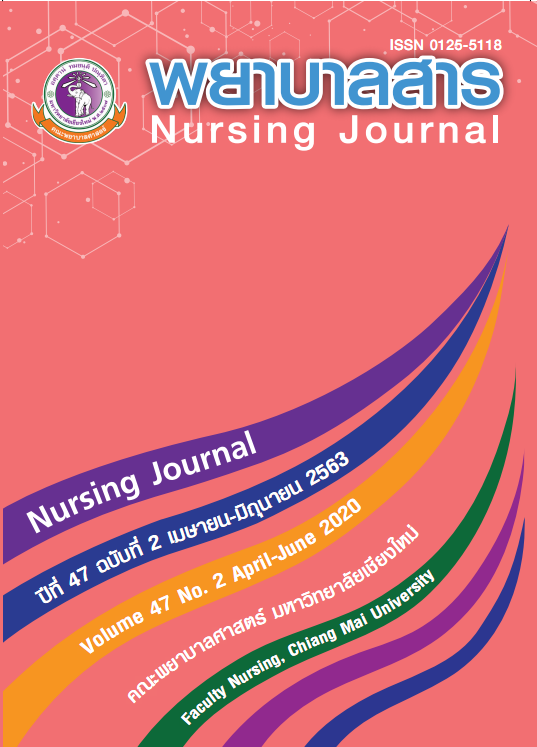Knowledge and Practice of Primary Caregivers for Promoting Child’s Emotional Intelligence in Child Development Centers
Keywords:
Knowledge and Practice, Primary Caregiver, Promoting Child’s Emotional IntelligenceAbstract
Children, aged 3-5, are ready to engage in activities promoting emotional intelligence from.their primary caregivers. The purpose of this descriptive correlational study is to assess primary caregivers’ knowledge and practices for promoting emotional intelligence and to explore the correlation between knowledge and practices among primary caregivers. The participants included 194 primary caregivers of children aged 3-5 years. The data was collected when participants took their child to receive care at the 10 child development center in Chiang Mai. The instruments used for data collection consisted of a knowledge for promoting child’s emotional intelligence questionnaire and a promoting child’s emotional intelligence practice questionnaire. Data were analyzed using descriptive statistics and Pearson’s correlation coefficient.
Results revealed that primary caregivers had a high level of knowledge for promoting emotional intelligence. Primary caregivers’ promotion of emotional intelligence was also high; 64.90% promoted goodness at a high level, 64.40% promoted courage at a high level, and 76.30% had high levels of promoting happiness. The positive correlation between knowledge and promotion was moderate (r = .429, p < .001).
Findings could be used by nurses and persons involved in promoting child’s emotional intelligence in child development centers as baseline data for improving knowledge of primary caregivers. This will increase the promotion of children’s emotion intelligence among primary caregivers in the context of each area properly and continuously. That will result in the promotion of good emotional intelligence for Thai children in the long term and their development into quality adults in the future.
References
Baker, B. L., McIntyre, L. L., Blacher, J., Crnic, K., Edelbrock, C., & Low, C. (2003). Pre-school children with and without developmental delay: behavior problems and parenting stress over time. Journal of Intellectual Disability Research, 47(45), 217-230.
Brackett, M. A., Rivers, S. E., & Salovey, P. (2011). Emotional intelligence: implications for personal, social, academic, and workplace success. Social and Personality Psychology Compass, 5(1), 88-103.
Belcher, H. M., Watkins, K., Johnson, E., & Ialongo, N. (2007). Early head start: factors associated with caregiver knowledge of child development, parenting behavior, and parenting stress.HNHD: NHSA DIALOG, 10(1), 6-19.
Bellinger, G., Castro, D., & Mills, A. (2004). Data, information, knowledge, and wisdom. Retrieved from http://courseweb.lis.illinois.edu/~katewill/spring2011-502/502%20and%20other% 20readings/bellinger%20on%20ackoff%20data%20info%20know%20wisdom.pdf
Chanaim, S. (1997). Developmental psychology (4th ed.). Bangkok: Thai Wattanapanich Printing Company Limited. (In Thai)
Changkam, C. (2007). Knowledge, Attitude and Practice of Parents in Promoting Child
Development aged 1-3 Years in Warin Chamrap, Ubon Ratchathani Province (Master’s thesis, Sukhothai Thammathirat Open University). (In Thai)
Department of mental health, Ministry of Public Health. (2003). Knowledge guide for developing emotional intelligence in children aged 3-11 years for parents / guardians. Retrieved from https://www.dmh.go.th/ebook/dl.asp?id=14#. (In Thai)
Department of mental health, Ministry of Public Health. (2007). Intelligence Report of Thai Children for the Year 2007. Nonthaburi: Department of mental health, Ministry of Public Health. (In Thai)
Department of mental health, Ministry of health. (2011). Situation of school age health problems. Retrieved from http://www.dmh.go.th/downloadportal/Strategy/วัยเรียน.pdf (In Thai)
Department of Mental Health, Ministry of Public Health. (2012). Manual for parents to develop their children’s EQ. developed by The Department of Mental Health, Ministry of Public Health, Thailand. Retrieved from http://www.klb.dmh.go.th/eng/index.php?m= publication&op=detail&research_id=583. (In Thai)
Department of Mental Health, Ministry of Public Health. (2014). A guide to developing emotional intelligence for young children for parents (2nd ed.). Nonthaburi: Printing House, Agricultural Cooperative of Thailand Limited. (In Thai)
Hastings, R. P. (2002). Parental stress and behavior problems of children with developmental disability. Journal of Intellectual and Developmental Disability, 27(3), 149-160.
Khaigaew, J. (2002). Perception and Behavior on Promoting Child Development of Households in Rural Community (Independent Study, Chiangmai University). (In Thai)
Konkijkovin, W. (1999). Study of behavior of preschool children in communities in northernBangkok. Journal of the Psychiatric Association of Thailand, 44(3), 228-238. (In Thai)
Kuebli, J. (1994). Young children’s understanding of everyday emotions. Young Children, 49(3),36-47.
Lecavalier, L., Leone, S., & Wiltz, J. (2006). The impact of behavior problems on caregiver stress in young people with autism spectrum disorders. Journal of Intellectual Disability Research, 50(3), 172-183.
Parks, P. L., & Smeriglio, V. L. (1986). Relationships among parenting knowledge, quality of stimulation in the home and infant development. Family Relations, 411-416.
Piercy, K. W., & Chapman, J. G. (2001). Adopting the Caregiver Role: A Family Legacy. Family Relations, 50(4), 386-393.
Sakolwasan, U. (2007). Knowledge, self-efficacy, and behaviors in promoting preterm infant development among primary caregivers (Master’s thesis, Chiangmai University). (In Thai)
Salovey, P., & Mayer, J. D. (1997). What is emotional intelligence. In P. Salovey & D. J. Sluyer (Eds.). Emotional development and emotional intelligence: Educational implications. New York: Basic books.
Santrock, J. W. (2004). Child Development (10th ed.). New York: McGraw-Hill.
Sittichok, J., & Wichan, N. (1999). The role of parents in caring and promoting preschool child development. Journal of Health and Environmental Health Promotion, 22(3). (In Thai)
Sriwongpanich, N. (2014). Guidelines for the implementation of preschool child development projects to support the national strategy, fiscal year 2014. Nonthaburi: Printing House,Agricultural Cooperative of Thailand Limited. (In Thai)
Suphakun, J. (2007). Effects of Participatory Learning Process on Families’ Knowledge and Behaviors to Promote Emotional Intelligence Among Children Aged 3–5 years (Independent Study, Master of Nursing, Khon Kaen University). (In Thai)
The Secretariat of the Council of Education, Ministry of Education. (2007). Policies and strategies for early childhood development (0-5 years), long term, 2007-2016. Bangkok: Partnership VTC Communication. (In Thai)
Downloads
Published
How to Cite
Issue
Section
License
บทความที่ได้รับการตีพิมพ์เป็นลิขสิทธิ์ของวารสารพยาบาลสาร
ข้อความที่ปรากฏในบทความแต่ละเรื่องในวารสารวิชาการเล่มนี้เป็นความคิดเห็นส่วนตัวของผู้เขียนแต่ละท่านไม่เกี่ยวข้องกับมหาวิทยาลัยเชียงใหม่ และคณาจารย์ท่านอื่นๆในมหาวิทยาลัยฯ แต่อย่างใด ความรับผิดชอบองค์ประกอบทั้งหมดของบทความแต่ละเรื่องเป็นของผู้เขียนแต่ละท่าน หากมีความผิดพลาดใด ๆ ผู้เขียนแต่ละท่านจะรับผิดชอบบทความของตนเองแต่ผู้เดียว






